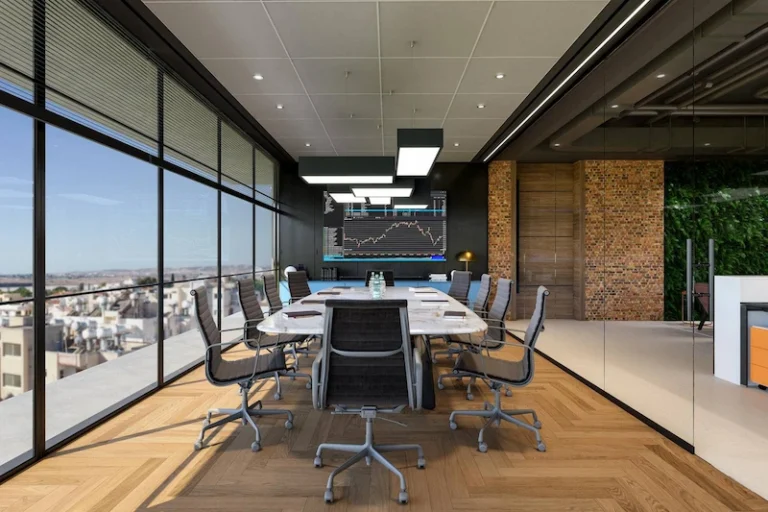Introduction
Cyprus is quietly reshaping its office landscape. As the economy pivots toward technology, finance, and international services, landlords, developers, and occupiers are rethinking what an office must deliver. Future-ready offices in Cyprus are about more than stylish fit-outs. They connect energy efficiency, hybrid work, local planning rules, and the need to attract talent across Limassol, Nicosia, and beyond.
Why Cyprus now?
Cyprus is actively positioning itself as an international business and tech hub, with government and investment agencies promoting digital transformation and incentives for foreign companies. That push is translating into demand for modern office space, particularly in Limassol and Nicosia where transaction volumes and investment activity have been strongest.
Design principles for future-ready offices
- Flexible floor plates and mixed-use amenities
Flexibility in layout allows businesses to scale up or down without costly refits. Good office design in Cyprus increasingly incorporates mixed-use ground floors, public-facing retail, quiet focus zones, and collaborative hubs. These features help buildings remain relevant as tenant needs change. - Energy performance and green credentials
European rules and national transposition on the energy performance of buildings are raising the bar for offices. Owners who invest in insulation, efficient glazing, smart heating and cooling controls, and daylighting not only cut operating costs but also meet emerging regulatory expectations and tenant demand for healthier workplaces. The EU Energy Performance of Buildings Directive sets new targets for member states, and Cyprus has transposed those requirements into national law for energy performance. - Connectivity and digital infrastructure
Future-ready workplaces in Cyprus prioritize reliable, high-speed internet, secure cloud access, and flexible telecoms infrastructure. For international firms and tech companies, low-latency connections and redundancy are non-negotiable. Investing in backbone connectivity and in-building wireless systems pays back through higher occupier demand. - Health, comfort, and employee experience
Workplaces that support wellbeing see better retention. Features that matter include natural ventilation, acoustic privacy, ergonomic zones, and easy access to outdoor terraces or green spaces. Including these elements helps offices attract skilled workers who have a choice about where they base themselves. - Adaptation to hybrid work
Many Cypriot businesses now operate hybrid models. Offices must support meeting-rich days, team workshops, and social catch-ups while enabling heads-down work remotely. That means reservable meeting rooms, flexible desks, and hospitality-style reception areas geared toward brief, high-value office visits. Recent local surveys show a rapid rise in hybrid practices among Cypriot firms, a trend that affects how space is used throughout the week.
Where this is happening in Cyprus
Limassol is a clear hotspot for new and upgraded office product, driven by finance, shipping, and fintech firms. Nicosia remains an important administrative and professional services cluster with growing demand for technology-enabled space. Industry reviews and market reports from recent years show Limassol and Nicosia leading the market in transaction volumes and investment activity, and developers are responding with higher specification buildings and flexible floor plans.
A short case example
Consider a mid-sized office block in Limassol that was refurbished with improved glazing, LED lighting, modern HVAC controls, and a co-working style reception floor. After the retrofit the owner reported stronger leasing interest, shorter vacancy periods, and a premium on rent for plug-and-play suites. This kind of outcome is increasingly common in coastal business districts where tenants have many location choices.
Support and incentives
There are public and private incentive schemes that can reduce the cost of upgrades. Investment promotion bodies and EU funding programs have pages dedicated to digital transformation, energy efficiency, and skills development. Owners should explore grant programs, tax incentives, and technical assistance offered at national and EU level to lower capital costs and speed implementation.
Practical steps for landlords and developers
- Prioritize energy retrofits
Target the building envelope, lighting, and HVAC systems first. These upgrades offer immediate savings and improve a building’s marketability. - Offer flexible lease terms and plug-and-play suites
Smaller tenants and startups want quick move-in options. A stock of fitted, short-term lease suites attracts a broader tenant mix. - Create smart common areas
Shared lounges, bookable meeting rooms, and small event spaces increase footfall and encourage community around the building. They also support a hybrid workforce when people come in for specific activities. - Certify and communicate sustainability gains
Even when local green certification is still emerging, track and share performance metrics. Tenants increasingly expect clarity about energy use and indoor environmental quality.
Barriers and considerations
Developers must balance the economics of retrofit with rental yields. Cyprus still has pockets of older stock that require significant investment. There is also a skills gap for building managers who can operate smart systems. Planning and permitting can add time to projects, so realistic timelines and stakeholder engagement are essential.
What occupiers should look for
Companies choosing space in Cyprus should evaluate a building on three practical measures: cost of occupation, flexibility of layout, and data/connectivity resilience. Add to that clear evidence of energy performance and a landlord willing to support hybrid working needs. Negotiating flexible break clauses and staged fit-outs can reduce risk while keeping options open.
A short roadmap for action
Month 1 to 3: audit energy, connectivity, and space utilization.
Month 4 to 9: prioritize quick wins such as LED lighting, network upgrades, and creating bookable spaces.
Month 10 to 24: implement larger retrofits, apply for any applicable incentives offered by government or investment bodies, and refine policies for hybrid work.
Conclusion
The outlook for future-ready offices in Cyprus is pragmatic and optimistic. With public strategies that support digital transformation and a real estate market that shows demand for upgraded, efficient product, the island is well placed to attract international occupiers. The winners will be buildings that marry tangible efficiency upgrades with practical flexibility and resilient digital infrastructure. Occupiers and owners who act now will reduce running costs, shorten vacancy cycles, and position their assets for the long term and capture higher value in a competitive market.
